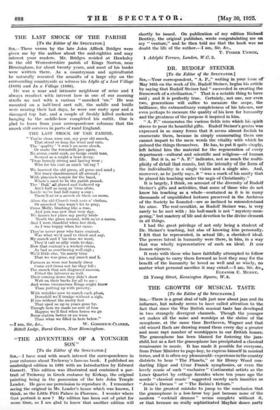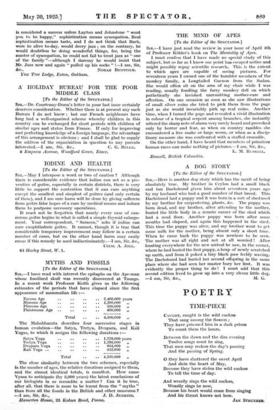THE GROWTH OF MUSICAL TASTE
[To the Editor of the SPECTATOR.] SIR,—There is a great deal of talk just now about jazz and its influence, but nobody seems to have called attention to the fact that since the War British musical taste has developed in two strangely divergent channels. Though the younger set makes all the noise and worships at the shrine of the saxophone, at the same time Beethoven, Wagner and that old wizard Bach are drawing round them every day a greater and more rapt number of worshippers in our British homes. The gramophone has been blamed for fostering the jazz- child, but as a fact the gramophone has precipitated a classical renaissance in music. It has made it possible for everyone, from Prime Minister to page-boy, to express himself in musical terms, and it is often my pleasureabla experience in the country districts to hear " The Planets," or Sir Henry Wood con- ducting Elgar and Cesar Franck symphonies, or even the lovely music of such " exclusive " Continental artists as the Lener Quartet by cottage firesides where ten years ago the words " classical music " suggested merely such inanities as " Jessie's Dream " or " The Robin's Return."
It is the greatest mistake to jump to the conclusion that the gramophone is a low-brow toy just because none of the modern " cocktail dramas " seems complete without it, or that because no really sophisticated Mayfair dance party
is considered a success unless Layton and Johnstone " want you to be happy," sophistication means syncopation. Real sophistication means taste, and I do not think that Bach, were he alive to-day, would decry jazz ; on the contrary, he would doubtless be doing wonderful thi as, for, being the master of syncopation, he could not fail to treat jazz as " one of the family "—although I daresay he would insist that Mr. Jazz now and again " pulled up his socks " !—I am, Sir,











































 Previous page
Previous page